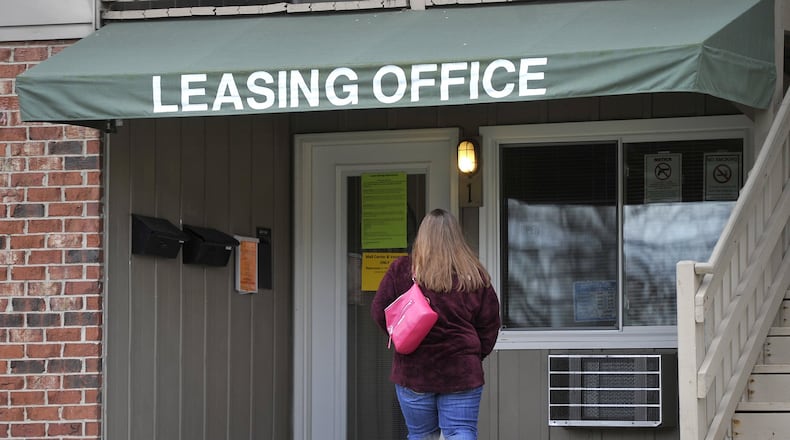ALL IN ONE SPOT: Coronavirus main page has links to dozens of stories
Some landlords and creditors are giving people grace periods or extensions on payments, but analysts say the most important thing is to reach out immediately, and not to assume that’s true in your case.
“The best thing anybody can do is to communicate,” said Bill Burke, president and CEO of Day-Air Credit Union. “We are strongly recommending that anybody facing financial hardship call or email the individual or company that is due a payment. … Whatever it takes to communicate.”
Burke said Day-Air has temporarily stopped all home foreclosures or vehicle repossessions, and is working with members who lost jobs on delaying loan payments.
But Jim McCarthy, president and CEO of the Miami Valley Fair Housing Center, which works on behalf of renters and homeowners, said that cooperative approach is not universal.
RELATED: What companies are hiring during mass closures?
“I think the majority of housing providers want to do the best by their residents and are trying to find ways to work with people,” McCarthy said. “But there are also some landlords that are … trying to intimidate people, saying they’re going to add late fees, or move forward with evictions, saying people have to pay on the first of the month no matter what.”
McCarthy said renters should absolutely pay if they can, and he encouraged people to contact landlords via email, to create a record of it. He said even offering a partial payment if you’re struggling shows a landlord you’re making an effort and acting in good faith.
But he reminded those in truly dire straits that a landlord cannot evict you or move you out without a court order signed by a judge. And most eviction proceedings have been suspended in area courts for now.
“I expect that we’re going to see more of those (court) deadlines extended,” McCarthy said. “Some were through April 6 — that was Montgomery County Municipal Court — and I think that will probably be extended as a result of the president’s decision to extend the social distancing policy through the end of April.”
RELATED: DeWine says stay-at-home order could be extended
Representatives of the Greater Dayton Apartment Association could not be reached for comment, but a list of “best management practices” on their website’s coronavirus page suggests that landlords “make payment agreements with those who cannot pay, similar to when the government shutdown occurred.”
For some residents, their ability to pay soon will depend on unemployment or federal stimulus payments.
Bret Crow, spokesman for the Ohio Department of Job and Family Services, said the state is processing and paying unemployment claims, but the system has been slowed by a record level of demand.
Crow said so far, the state has made payments of almost $40 million to more than 95,000 claimants. But in the week of March 15-21 alone, there were 187,780 initial jobless claims — close to the previous record for a full month. And the highest single day of claims was the following week, showing that the surge has not stopped.
RELATED: Local ER doctor describes dealing with unknown
“We recognize the hardship that the COVID-19 pandemic has placed on many Ohio families,” Crow said. “Despite the intermittent issues with the online claims system, going to unemployment.ohio.gov remains the best way for Ohioans to file a claim. Your readers should know that even if they can’t consummate submitting an application right away, their filing date will be retroactive to when they first tried to apply.”
While rent or mortgage payments are in the forefront of people’s minds on the first of the month, many other bills are also coming due.
Dayton Power & Light announced that for at least 30 days, it will stop disconnections of electric service due to nonpayment. But like other companies, DP&L warned customers that they will be responsible for all charges tied to their electric usage eventually.
A new order from the state EPA office now prevents a person’s water service being shut off due to non-payment during the state of emergency.
RELATED: High school seniors struggle with loss of milestone events
The federal government has suspended payments on federal student loans for six months. Interest will not accrue during that period. But private student loans, which make up more than 10% of all college loans, are not covered by the moratorium on payments. Some local residents have said their loan servicers are still demanding on-time payment and threatening wage garnishment or property liens.
Burke, the Day-Air CEO, said his credit union is offering members affected by the shutdown a “here to help” loan that does not require a payment for 90 days. But he said any help starts with communication.
“I can’t emphasize this enough. Nobody should assume that (a grace period or extension) is taking place,” Burke said. “They really need to contact their lender and make arrangements.”
McCarthy, of the Fair Housing Center, said he’s never seen a financial situation like this one that so suddenly affected so many local residents. He encouraged anyone in trouble to reach out.
“Reach out to Miami Valley Fair Housing or the Community Action Partnership or Legal Aid or the Human Relations Council in Dayton — we’re all trying to work together to help people make the best choices,” McCarthy said. “People need to remember they’re not alone. There are a whole lot of people in the very same position through no fault of their own. If ever there’s a time not to be embarrassed, this is the time.”
About the Author

